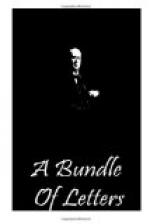It is interesting in this manner to perceive, so largely developed, the germs of extinction in the so-called powerful Anglo-Saxon family. I find them in almost as recognisable a form in a young woman from the State of Maine, in the province of New England, with whom I have had a good deal of conversation. She differs somewhat from the young man I just mentioned, in that the faculty of production, of action, is, in her, less inanimate; she has more of the freshness and vigour that we suppose to belong to a young civilisation. But unfortunately she produces nothing but evil, and her tastes and habits are similarly those of a Roman lady of the lower Empire. She makes no secret of them, and has, in fact, elaborated a complete system of licentious behaviour. As the opportunities she finds in her own country do not satisfy her, she has come to Europe “to try,” as she says, “for herself.” It is the doctrine of universal experience professed with a cynicism that is really most extraordinary, and which, presenting itself in a young woman of considerable education, appears to me to be the judgment of a society.
Another observation which pushes me to the same induction—that of the premature vitiation of the American population—is the attitude of the Americans whom I have before me with regard to each other. There is another young lady here, who is less abnormally developed than the one I have just described, but who yet bears the stamp of this peculiar combination of incompleteness and effeteness. These three persons look with the greatest mistrust and aversion upon each other; and each has repeatedly taken me apart and assured me, secretly, that he or she only is the real, the genuine, the typical American. A type that has lost itself before it has been fixed—what can you look for from this?
Add to this that there are two young Englanders in the house, who hate all the Americans in a lump, making between them none of the distinctions and favourable comparisons which they insist upon, and you will, I think, hold me warranted in believing that, between precipitate decay and internecine enmities, the English-speaking family is destined to consume itself; and that with its decline the prospect of general pervasiveness, to which I alluded above, will brighten for the deep-lunged children of the Fatherland!
CHAPTER IX
MIRANDA HOPE TO HER MOTHER.
October 22d
Dear Mother—I am off in a day or two to visit some new country; I haven’t yet decided which. I have satisfied myself with regard to France, and obtained a good knowledge of the language. I have enjoyed my visit to Madame de Maisonrouge deeply, and feel as if I were leaving a circle of real friends. Everything has gone on beautifully up to the end, and every one has been as kind and attentive as if I were their own sister, especially Mr. Verdier, the French gentleman, from whom I have gained more than I ever expected (in six weeks), and with whom I have promised to correspond. So you can imagine me dashing off the most correct French letters; and, if you don’t believe it, I will keep the rough draft to show you when I go back.




